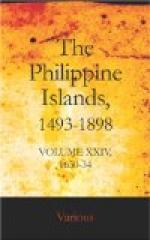We were welcomed cordially in Manila, as they were not expecting a company, for the procurator sent by the province—namely, the father reader Fray Juan de Pineda [18]—was detained in Nueva Espana. When we arrived, already the favor bestowed upon the province by his Majesty (in a time when, as ran the news, little was expected) was already being extended; for the news that circulated through the court was not very reliable. But his Majesty, better informed, attended to everything as a pious king. He sent religious to the province, and gave the bishopric to Don Fray Pedro de Arce, as above stated. He gave also an alms of two thousand pesos to the Manila house, and joined to it a visitor-general, with orders to attend to whatever needed remedy. His Majesty should be considered as a most kind benefactor of the orders, and very thankful for the services that our order has performed in these regions for him.
The first thing given attention was the examination of the papers of our father master Fray Diego de Guevara. When they had been examined in the definitorio, there were no objections possible. Therefore, with humble mien, the venerable father definitors were very obedient, and complied with the letters of our most reverend father. They were much beholden for the favors received from our pious king, and served him likewise in this thing that he ordered. Thus was our father visitor-general received by the definitorio. He was visitor-general for the entire province, since necessarily the body must obey the movements of its head.
Our father visitor was especially charged by the court to inquire into our Father Solier’s acts; and, if necessary, he was to deprive him of his office and declare it forfeited. But he found matters quite different from those reported there, for he found Father Solier’s province under his government very much reformed, and his devotion admirable. For our Father Solier was in all things a remarkable man; and by his letter to the province and his systematic conduct of it, and the manner in which he conserved it, one can see how well he played his part. Thus if he had lost any of his luster in his dispute with the chapter of the past intermedium, he more than made it up. And this being so understood by our father visitor-general, he congratulated Father Solier highly, and honored him to the utmost.
It appears that our Father Solier was obliged to give account of himself. Therefore leaving the province so well conducted with a so honored superior, who came to it to honor and to investigate it, he determined to go to the kingdoms of Espana. Accordingly, having obtained leave for this from the father visitor, he set sail that year, with authorization from the province to take care of its causes and plead them in the court. Then, accompanied by father Fray Lucas de Atienza, [19] an aged religious, and at that time prior of the convent of Ibabay in the Pintados, he set sail in the vessels which left that year, in




